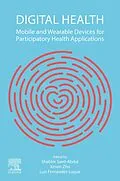Digital Health: Mobile and Wearable Devices for Participatory Health Applications is a key reference for engineering and clinical professionals considering the development or implementation of mobile and wearable solutions in the healthcare domain. The book presents a comprehensive overview of devices and appropriateness for the respective applications. It also explores the ethical, privacy, and cybersecurity aspects inherent in networked and mobile technologies. It offers expert perspectives on various approaches to the implementation and integration of these devices and applications across all areas of healthcare. The book is designed with a multidisciplinary audience in mind; from software developers and biomedical engineers who are designing these devices to clinical professionals working with patients and engineers on device testing, human factors design, and user engagement/compliance. - Presents an overview of important aspects of digital health, from patient privacy and data security to the development and implementation of networks, systems, and devices - Provides a toolbox for stakeholders involved in the decision-making regarding the design, development, and implementation of mHealth solutions - Offers case studies, key references, and insights from a wide range of global experts
Inhalt
Contributors xi
List of reviewers xiii
Preface xv
1. Introduction to digital health approach and mHealth applications
for participatory health 1
Mohy Uddin, MD and Shabbir Syed-Abdul, MD, MSc, PhD
References 5
2. Digital health in the era of personalized healthcare:
opportunities and challenges for bringing research and patient
care to a new level 7
Jorge Cancela, PhD, Iliàs Charlafti, MSc, Seya Colloud, PharmD and
Catherine Wu, MSc
1. An introduction to the promise of the digital era 7
2. Opportunities for digital health in the context of personalized healthcare 9
3. Challenges throughout the life cycle of digital health solutions 19
4. Conclusions 27
Acknowledgments 28
Conflicts of interest 28
References 28
3. Wearables, smartphones, and artificial intelligence for digital
phenotyping and health 33
Ignacio Perez-Pozuelo, MSc, MS, Dimitris Spathis, Msc,
Emma A.D. Clifton, PhD and Cecilia Mascolo, PhD
1. Towards digital phenotyping 33
2. Mobile health 34
3. Artificial intelligence 37
4. Toward objective measures of physical behaviors in epidemiology 39
5. Conclusion 49
Acknowledgments 50
References 50
4. Artificial intelligence/machine learning solutions for mobile and
wearable devices 55
Zhenxing Xu, PhD, Bin Yu, PhD and Fei Wang, PhD
1. Mobile and wearable devices 55
2. Different types of data collected by mobile and wearable devices and
applications 57
3. The components of mobile- and wearable devicesebased applications 61
4. The ML solutions for mobile and wearable devices 62
5. Case study : the application of mobile and wearable device data in the
COVID-19 pandemic 69
6. Conclusion 72
Acknowledgment 73
References 73
5. mHealth for research: participatory research applications to
gain disease insights 79
Ipek Ensari, PhD and Noémie Elhadad, PhD
1. Background on research mHealth applications 80
2. User engagement and participatory design in mHealth research 81
3. User engagement strategies and metrics 86
4. Making disease discoveries and insights from self-tracked data 94
5. Conclusion and discussion 96
Acknowledgments 97
References 97
6. Mobile health apps: the quest from laboratory to the market 103
Juan José Lull, PhD, Antonio Martínez-Millana, PhD and
Vicente Traver, PhD
1. Introduction 104
2. Business model 104
3. Context: business models 105
4. From business models to products 106
5. Product dependencies 107
6. Marketing strategy 108
7. Intellectual property rights 109
8. Business scenarios 110
9. Distribution: exploitation models 114
10. Product use cases 115
11. Conclusion 121
References 121
7. mHealth in public health sector: challenges and opportunities
in low- and middle-income countries: a case study of Sri Lanka 123
Pamod Amarakoon, MBBS, Roshan Hewapathirana, MBBS, MSc, PhD and
Vajira H.W. Dissanayake, MBBS, PhD
1. Introduction 124
2. Use of mobile technology in the public health sector: Asian Regional
context 128
3. Opportunities 130
4. Challenges 134
References 141
8. How to use the Integrated-Change Model to design digital
health programs 143
Kei Long Cheung, PhD, Santiago Hors-Fraile, PhD and
Hein de Vries, PhD
1. Theory to understand health behavior 144
2. Integrated-Change Model 148
3. Digital health and tailoring 150
4. Pragmatic methodology to design digital health 151
5. Conclusions 156
References 156
9. Illustration of tailored digital health and potential new avenues 159
Kei Long Cheung, PhD, Santiago Hors-Fraile, PhD and
Hein de Vries, PhD
1. Case of tobacco smoking 160
2. New avenues of computer tailoring 164
3. Use of artificial intelligence to progress computer tailoring 164
4. Conclusions 167
References 168
10. Sustainability of mHealth solutions for healthcare system
strengthening 171
Mohamed-Amine Choukou, PhD
1. Introduction 171
2. mHealth solutions: disruptive technologies as a remedy for a
system under strain 173
3. Digital twin technology as an example of technology-driven
healthcare system change 176
4. mHealth solutions sustainability 177
5. mHealth solutions: path to sustainability 179
6. Conclusion and future directions 181
References 187
11. Digital health regulatory and policy considerations 191
Robert Jarrin, JD and Kapil Parakh, MD, MPH, PhD
1. Learning objectives 191
2. Flow and rationale of the chapter structure 192
3. Fundamentals of government and healthcare 192
4. How the US federal government is organized 192
5. Health and human services law, regulations, and policy 193
6. Government and its impact on digital health 194
7. International regulation of digital health 206
8. Conclusion 207
9. Description of pedagogical elements (e.g., case study,
infographics required, key references) 207
Index 209
